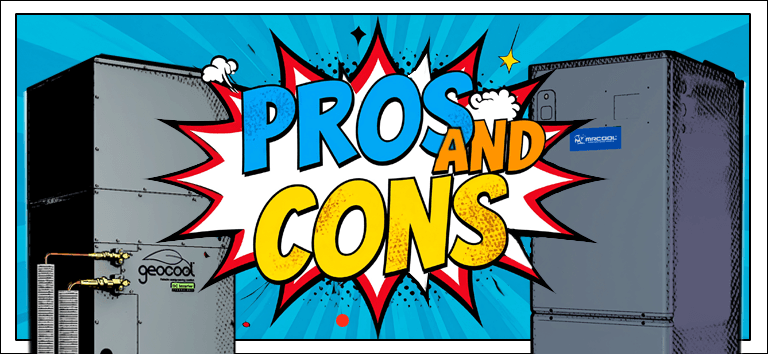When it comes to efficient, eco-friendly heating and cooling, heat pumps lead the way, but not all heat pumps are created equal. If you’re exploring options for your home, you’ve likely encountered two main types: geothermal heat pumps (also called ground-source heat pumps) and air-source heat pumps.
At MRCOOL®, we understand how important it is to choose the right system for your climate, property layout, and long-term goals. In this post, we’ll explore the key differences between geothermal and air-source heat pumps, examine their pros and cons, and help you determine which solution might work best for your lifestyle.
The Difference Between Air Source and Ground Source Heat Pumps
Both air-source and ground-source (geothermal) heat pumps work by transferring heat rather than generating it. This makes them more efficient than many traditional HVAC systems. However, they differ in where they get that heat.
An air-source heat pump pulls warmth from the outside atmosphere and brings it inside. In summer, it reverses the cycle to cool by removing indoor heat and dumping it outside.
A geothermal heat pump taps into stable underground temperatures. By circulating fluid through buried loops, it absorbs heat in winter and dissipates it in summer. This makes it remarkably consistent and efficient year-round.
What Is an Air Source Heat Pump?
Air-source heat pumps are among the most common residential HVAC systems on the market today. These systems rely on outdoor air to heat and cool your home. They’re favored for their affordability, straightforward installation, and solid performance in moderate climates.
Thanks to technological advancements like inverter technology, modern air-source heat pumps have become more efficient and capable than ever before. They’re especially popular for homeowners looking to retrofit existing homes with a more sustainable HVAC solution.
However, efficiency can decline in colder temperatures, often requiring a backup heat source during extreme weather. To solve this, many models today are equipped with dual-fuel compatibility or built-in electric resistance heaters that help maintain comfort even during frigid conditions.
Additionally, air-source heat pumps are a great option for smaller properties or urban homes, where installing underground loops for geothermal systems may not be feasible. Their compact size and lower installation requirements make them accessible to a wide range of homeowners.
What Is a Ground Source Heat Pump (Geothermal)?
A ground source heat pump uses underground loop systems to regulate indoor temperature. These loops absorb or release heat using the relatively stable temperature of the earth, which typically remains between 45°F and 75°F year-round.
Because of this consistent source, geothermal systems achieve greater energy efficiency and maintain performance regardless of outdoor conditions. They’re a long-term investment often chosen for new construction or homes with available land to install the required ground loops.
There are different types of ground loop configurations, including horizontal, vertical, and pond/lake loops. The choice depends on land availability, soil conditions, and local regulations. Though more complex to install, these systems offer a high degree of reliability and are known for their quiet operation, durability, and minimal maintenance needs.
While geothermal comes with a higher upfront cost and more complex installation, they offer impressive energy savings, longer lifespan, and environmental benefits. They also often qualify for significant federal, state, and local incentives that can help offset the initial investment.
Pros and Cons of an Air Source Heat Pump

Air-source heat pumps are incredibly versatile, but they come with both benefits and drawbacks that should be considered based on your specific needs.
Advantages of Air Source Heat Pumps
- Lower Upfront Cost: One of the most attractive features is the affordable price point compared to geothermal systems.
- Simpler Installation: No need to dig or disrupt landscaping makes these units easier to install in a wider variety of settings.
- Effective in Mild to Moderate Climates: Ideal for areas where temperatures don’t frequently dip below freezing.
- Versatile Applications: Easily adapted for retrofits and can be combined with existing ductwork or ductless setups.
- Smart Features Available: Integration with home automation and control apps makes them user-friendly and customizable.
Disadvantages of Air Source Heat Pumps
- Less Efficient in Cold Climates: May need a secondary heat source to ensure comfort during very low temperatures.
- Outdoor Unit Exposure: Weather, animals, and debris can wear down the system over time.
- Shorter Lifespan: Typically around 15–20 years, which is less than most geothermal options.
- More Frequent Maintenance: Routine servicing is essential to maintain optimal performance, especially in climates with heavy seasonal use.
Pros and Cons of a Ground Source Heat Pump
Geothermal systems are often seen as the gold standard in HVAC efficiency, but they do require a bigger upfront commitment. Let’s explore the main benefits and trade-offs.
Advantages of Ground Source Heat Pumps
- Exceptional Energy Efficiency: Their ability to leverage consistent ground temperatures leads to outstanding efficiency and lower energy use year-round.
- Lower Operating Costs: Over time, the savings on utility bills can add up significantly, especially in areas with extreme seasonal temperatures.
- Long System Lifespan: Underground loops can last 25 to 50 years, while indoor components typically exceed 20 years.
- Quiet Operation: Without a traditional outdoor condenser, geothermal units are virtually silent, making for a more peaceful outdoor environment.
- Performs Well in Any Climate: Whether it’s icy winters or sweltering summers, geothermal systems maintain efficiency and consistent indoor temperatures.
- Environmentally Friendly: With reduced reliance on fossil fuels and the potential to utilize renewable energy, geothermal systems are a top-tier sustainable choice.
Disadvantages of Ground Source Heat Pumps
- High Upfront Cost: Installation costs are substantially higher due to equipment and excavation, often deterring homeowners without long-term plans.
- Land or Space Requirements: Not every property can accommodate the space needed for ground loop systems, especially in dense urban settings.
- Disruptive Installation: The drilling or digging process can temporarily disturb landscaping and require professional expertise.
- Longer Payback Period: Although they offer excellent financial returns, it may take several years to recoup the investment through energy savings, depending on local electrical rates and rebates.
Heat Pump Comparison Table: Air Source Heat Pump vs. Ground Source (Geothermal)
Use this side-by-side comparison to evaluate which system might suit your home, lifestyle, and energy goals.
Category | Air Source Heat Pump | Ground Source (Geothermal) Heat Pump |
| How It Works | Transfers heat from outside air | Transfers heat from underground temperatures |
| Best Climate | Mild to moderate | All climates, including extreme cold/heat |
| Efficiency | Drops in colder temperatures | High efficiency year-round |
| Upfront Cost | Lower | Higher (due to excavation and loops) |
| Installation Complexity | Simple and quick | Invasive; requires digging/drilling |
| Operating Cost | Moderate to low | Very low |
| Lifespan | ~15–20 years | ~20–25 years (loops last up to 50 years) |
| Noise Level | Moderate | Very quiet |
| Smart Home Compatibility | Widely available | Available in select models |
| Space Required | Minimal | Significant outdoor space |
| Defrost Requirement | Yes | No |
| Maintenance Needs | Seasonal upkeep | Minimal |
| Eco-Friendliness | Reduces emissions | Higher CO₂ savings and renewable potential |
| Rebates & Incentives | Common | Often qualifies for higher tax credits (see incentives) |
| Ideal Use Case | Retrofitting existing homes | New builds or long-term homes with large yards |
MRCOOL®’s Innovative Heat Pump Solutions
At MRCOOL®, we pride ourselves on offering high-performance, energy-efficient, and easy-to-install HVAC systems tailored to fit every lifestyle. Whether you're leaning toward an air-source or geothermal solution, we have a product that meets your needs.
For those drawn to the long-term benefits of geothermal, our GeoCool® Inverter Series delivers superior efficiency, comfort, and reliability. It's built to perform in all climates and helps homeowners significantly reduce their energy consumption.
If you're more interested in air-source technology, the MRCOOL® Universal® DC Inverter Heat Pump is a standout option. This innovative system is compatible with a wide range of homes and delivers powerful heating and cooling without the need for complex installation.
We also offer a diverse lineup of other heat pump products, including:
- Universal® Series air conditioner heat pumps
- DIY® 5th Generation mini-split systems for hands-on installation
- Central Ducted Systems for whole-home comfort
- DIY® Multi-Zone Systems that allow customized control for different areas of your home
Whether you're upgrading your current HVAC or starting from scratch, MRCOOL® makes it easy to find, install, and enjoy the system that works best for you. Find a local retailer to get started.
FAQ
As you consider the best heat pump system for your home, here are answers to some frequently asked questions that can help clarify the details.
What type of defrost do geothermal systems use?
Unlike air-source heat pumps, geothermal systems don’t require a defrost cycle. Because they draw heat from the ground rather than the air, they’re not exposed to freezing outdoor temperatures that would cause frost buildup. This design eliminates the need for a defrost mode entirely, making geothermal systems more reliable and efficient in cold weather. It also contributes to their minimal maintenance needs and quiet performance.
What is the cost of a ground source heat pump?
The cost of a ground source heat pump system typically ranges between $15,000 and $35,000, depending on the size of your home, the loop configuration (horizontal, vertical, or pond/lake), and local installation costs. While the upfront cost is higher compared to air-source systems, homeowners can often offset this expense through tax credits, rebates, and long-term energy savings. Over the life of the system, many find that geothermal delivers one of the best returns on investment in the HVAC world.
Making the Right Choice

Ultimately, the right choice between a geothermal and air-source heat pump depends on your unique circumstances. Climate, budget, available space, and long-term energy goals all play a role in determining which system is best for you.
For example, if you're renovating an older home and live in a region with moderate weather, an air-source heat pump might be the more practical, budget-friendly solution. On the other hand, if you're building a new home or plan to stay in your current one for decades, a geothermal system could offer unmatched savings and environmental benefits over time.
Don't forget to consider the potential financial support available. Many homeowners can take advantage of government incentives, utility rebates, and financing options that make investing in either type of heat pump more accessible than ever.
